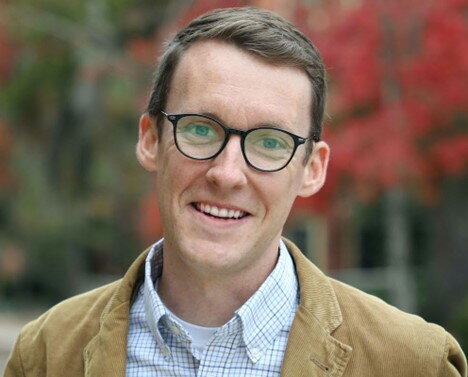The Philosophy Department is happy to announce a banner year in hiring, with three (3) exciting new members of our tenure-track faculty. Please join us in welcoming Professors Alison Duncan Kerr, Kevin Scharp, and John Schwenkler to the University of Illinois!
Alison Duncan Kerr
Professor Alison Duncan Kerr is an Assistant Professor of Philosophy, with broad research interests in feminist philosophy, the philosophy of gender, sex, and love, logic, theories of rationality, and the philosophy of artificial intelligence.
She has written widely on the emotions, including important pieces on envy in the philosophical tradition, the irrationality of anticipatory guilt, the rationality of emotional regulation, and emotions, rationality, and gender. More recently, she has begun exploring the role of emotions in reaction to algorithms and artificial intelligence. In 2022, she co-authored a piece in Minds and Machine entitled The End of Vagueness: Technological Epistemicism, Surveillance Capitalism and Explainable Artificial Intelligence (with Kevin Scharp).
Professor Kerr received her PhD from the Ohio State University, where she wrote a dissertation entitled “Affective Rationality” under the supervision of Professor Justin D’Arms (chair), Professor William Cunningham, Professor Richard Samuels, and Professor Sigrún Svavarsdóttir. Before that, Professor Kerr received her MA from University of Wisconsin–Milwaukee, writing a thesis entitled “Beyond the Meaning of ‘Meaning’: Rigidity and Semantic Externalism.” She spent two years and the University of Oregon, before transferring to get her undergraduate degree from Smith College.
In addition to her post-graduate work in philosophy, which she continued as a Research Fellow at the University of St Andrews, Professor Kerr was the Founding Director of The St Andrews Institute for Gender Studies and its related Master’s Programme and contributed to groundbreaking equality work in Higher Education at the The Work Inclusion Project.
Kevin Scharp
Professor Kevin Scharp is a Full Professor of Philosophy, with broad research interests in the philosophy of language, meta-ethics, the philosophy of artificial intelligence, theories of truth, the philosophy of science, and the history of analytic philosophy.
He is widely considered a world leader in the fertile research program of “conceptual engineering,” which recommends that philosophers not just analyze concepts but also assess their worth and suggest replacement of those that are defective. One of his books, Replacing Truth (Oxford University Press, 2013), carries out that research paradigm with respect to the concept of truth. Another of his books, The Semantics for Reasons (co-authored with Bryan Weaver), weds his interests in conceptual engineering and the philosophy of language with discussion of reasons in meta-ethics and how reasons are linked to rationality, morality, explanation, deliberation, and many other core philosophical topics. Much of his recent research has focused on artificial intelligence and machine learning.
Professor Scharp began his teaching career as an Assistant Professor of Philosophy at the Ohio State University in 2005. He was promoted to Associate Professor in 2010 and then to Full in 2014. In 2016, he moved to the University of St Andrews, where he was the Director of the Arché Philosophical Research Centre and supervisor of the Conceptual Engineering Research Seminar for five years. In 2022, he left St Andrews for the University of Twente and the Ethics of Socially Disruptive Technology (ESDIT) project.
Professor Scharp received his BA in mathematics from Washington University, in St. Louis, an MA in philosophy from the University of Wisconsin-Milwaukee, and his PhD in philosophy from the University of Pittsburgh.
John Schwenkler
Professor John Schwenkler joins us as a Full Professor of Philosophy, with broad research interests in the philosophy of mind, philosophy of action, philosophy of language, ethics, moral psychology, experimental philosophy, and the philosophy of cognitive science.
The focus of Professor Schwenkler’s current research is the philosophy of action, including as it bears on normative ethics and moral psychology. In particular, much of his recent work has been a response to G. E. M. Anscombe’s call for a sound “philosophy of psychology” to provide the needed foundation for philosophical moral theory. Schwenkler’s critically acclaimed guidebook to Anscombe’s Intention, published in 2019 by Oxford University Press, made a major contribution to this effort, and since then he has developed it in two directions: through a series of papers on practical reasoning, intention for the future, and the puzzle of how to account for the possibility of failing to act as one intends; and through a book project, with the title Describing Human Action, that draws on research in linguistics and experimental philosophy to address fundamental questions in the philosophy of action. Schwenkler also has active research projects in the philosophy and science of perception, self-consciousness and first-person thought, and the philosophy of ordinary language.
Professor Schwenkler received his BA in philosophy, summa cum laude, from the Catholic University of America, an MA in philosophy from the University of Notre Dame, and his PhD from the University of California, Berkeley. He began his teaching career as an Assistant Professor at Mount St. Mary's University in 2010. He then transferred to the Florida State University in 2013, where he became an Associate Professor in 2017 and a Full Professor in 2020. His research has been supported by an Academic Cross-Training Fellowship from the John F. Templeton Foundation (2018-2021), a faculty fellowship at the Notre Dame Institute for Advanced Study (2021-2022), and a Fellowship for Experienced Researchers from the Alexander von Humboldt Foundation (2022-2024, based at the University of Leipzig). One of his papers—Intending Is Believing—won the prestigious Marc Sanders Prize in the Philosophy of Mind in 2017. Another—Perception and Practical Knowledge—won the 2011 Philosophical Explorations Essay Prize.



